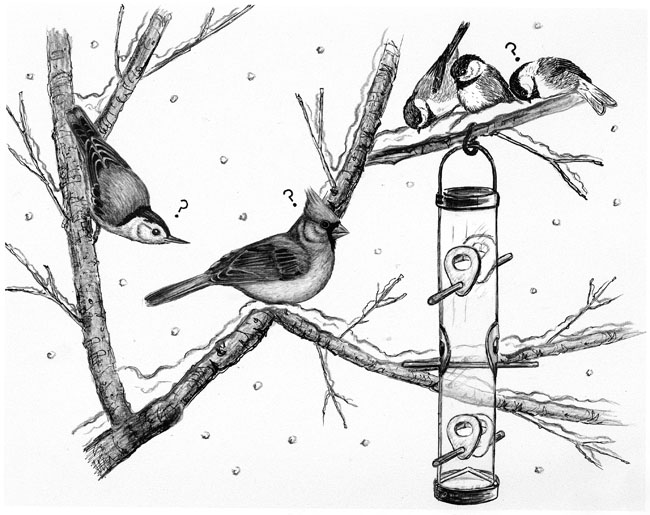
Dear Bird Folks,
I’m headed to Tucson, AZ for a vacation next week and I’m worried about my feeder birds. Will they be okay without me or should I try to find someone to keep my feeders filled?
– Melissa, Brewster, MA
Before I answer your question, Melissa, I have a question for you. Will you please take me with you? No, really. Will you? I swear I won’t be any trouble and since I’m a vegetarian, food won’t be an issue. I’ll be happy with the occasional bag of carrots. Plus, I can help identify any birds you see and I’m great at reading maps. In fact, I’m looking at a map right now and I see Tucson is in the southern part of Arizona, where it is much warmer than here. (Although, the North Pole is probably warmer than it is here right now.) What is going on? Remember when Cape Cod used to have mild winters? This year it has been so cold that some of the local politicians are putting their hands in their own pockets. (I know that’s an old joke, but when am I ever going to get the chance to use it again?)
As I write this column, yet another January blizzard has me trapped at home. But at least I’m inside where the electricity and heat are still working (for now), while the birds on my feeder are barely visible through the swirling snow. Goldfinches and chickadees are clinging to the blowing feeder like they’re on a ride at the Barnstable County Fair. It amazes me that birds, weighing less than an ounce, can somehow survive these storms. Meanwhile, I’m inside, sitting by the fire, wearing about five sweaters and I’m still cold. You would think that if my feeder ran out of food these birds would be doomed. But as it turns out, my feeder isn’t all that important to them. Without me in their lives the birds would be fine. It saddens me to think that, but it’s true.
In nature, few things are definite. The only things we can count on are the sunrise and sunset, the changing tides and the February appearance of Punxsutawney Phil. A constant supply of food is something no creature can depend upon. For example, some years there are tons of acorns for Blue Jays to eat, but other years there are none. The birds adjust. This year robins and waxwings are flooding my neighborhood because the local cedar trees are full of berries. But last year I saw none of these birds because the trees had little fruit. In December I saw hundreds of gannets diving for fish along the outer beaches, but not so many lately. Why? Because the fish have moved on and so have the birds. Birds expect food sources to disappear and thus they have plan B, plan C and plan D to fall back on, just like we do. If Stop & Shop runs out of Double Stuf Oreos, we don’t perish…we simply drive over to Shaw’s. (Although, if Shaw’s were out of them too, riots would break out.)
Birds don’t allow themselves to become dependent on a single food source. When we look out the window, we see “our” finches on the feeder, but bird banders tell us that we aren’t always seeing the same birds. They look like the same birds, but through the course of the winter we might see several hundred different finches on a single feeder. Other researchers have told us that even chickadees that live near birdfeeders may only derive about twenty percent of their total diet from the feeders. The rest of their food comes from wild seeds, insect eggs and Double Stuf Oreos. A lot of people, who are actually smarter than I am, preach about birds becoming dependant on our feeders, but I can’t find any evidence to support this claim. You would think that a guy who earns his living by selling birdseed would be a big fan of this “don’t ever stop feeding” philosophy. Aren’t I kind of cutting my own throat? Don’t worry; I know what I’m doing. When you go away, Melissa, your birds will simply move to your neighbor’s feeders and then your neighbor will need to buy more birdseed…from me.
While I don’t worry about people who stop feeding birds, I am concerned about the folks who leave their feeders unattended. Too many of my “weekend” customers like to fill their feeders before they leave. Please don’t do this. Unattended feeders can be a deathtrap for birds. Sometimes, for whatever reason, birds become stuck in feeders and need to be rescued. In addition, feeders aren’t perfect and sometimes seeds become trapped in them. Birds spend a lot of time and energy trying to get to seeds they can never reach. I’m also not a big fan of having someone else fill our feeders while we are gone. I’d rather there’d be no feeder than a semi-watched feeder. We feed birds for our entertainment. If we aren’t going to be home to watch the show, what is the point? Some people worry that if they remove their feeders when they go away the birds won’t come back. Don’t be so paranoid. I was just in Florida for two weeks. Before I left I not only brought in all of my feeders, but my heated birdbath as well. On the day I came home I put everything back outside and the birds greeted me like I was MacArthur returning to Manila. The birds didn’t desert me and they also didn’t starve while I was gone. One chickadee even commented on my tan.
Have a great trip to Arizona, Melissa. Don’t worry; your birds will be fine while you are gone. More importantly, what time does our flight leave? I just have to pack my bag of carrots and I’ll be ready to go.